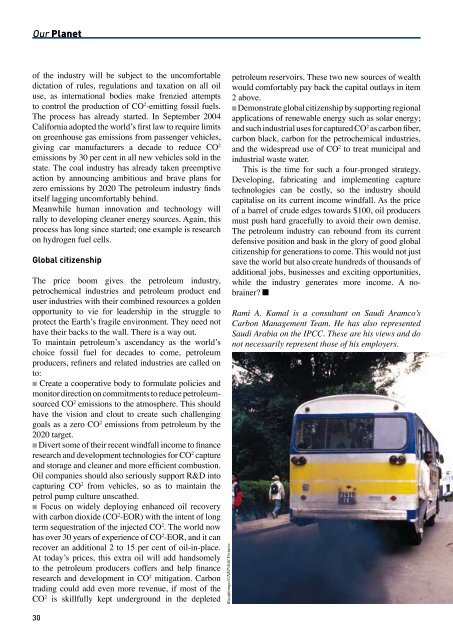UNEP Magazine "Climate change and economic development"
UNEP Magazine "Climate change and economic development"
UNEP Magazine "Climate change and economic development"
You also want an ePaper? Increase the reach of your titles
YUMPU automatically turns print PDFs into web optimized ePapers that Google loves.
Our Planet<br />
of the industry will be subject to the uncomfortable<br />
dictation of rules, regulations <strong>and</strong> taxation on all oil<br />
use, as international bodies make frenzied attempts<br />
to control the production of CO 2 -emitting fossil fuels.<br />
The process has already started. In September 2004<br />
California adopted the world’s first law to require limits<br />
on greenhouse gas emissions from passenger vehicles,<br />
giving car manufacturers a decade to reduce CO 2<br />
emissions by 30 per cent in all new vehicles sold in the<br />
state. The coal industry has already taken preemptive<br />
action by announcing ambitious <strong>and</strong> brave plans for<br />
zero emissions by 2020 The petroleum industry finds<br />
itself lagging uncomfortably behind.<br />
Meanwhile human innovation <strong>and</strong> technology will<br />
rally to developing cleaner energy sources. Again, this<br />
process has long since started; one example is research<br />
on hydrogen fuel cells.<br />
Global citizenship<br />
The price boom gives the petroleum industry,<br />
petrochemical industries <strong>and</strong> petroleum product end<br />
user industries with their combined resources a golden<br />
opportunity to vie for leadership in the struggle to<br />
protect the Earth’s fragile environment. They need not<br />
have their backs to the wall. There is a way out.<br />
To maintain petroleum’s ascendancy as the world’s<br />
choice fossil fuel for decades to come, petroleum<br />
producers, refiners <strong>and</strong> related industries are called on<br />
to:<br />
■ Create a cooperative body to formulate policies <strong>and</strong><br />
monitor direction on commitments to reduce petroleumsourced<br />
CO 2 emissions to the atmosphere. This should<br />
have the vision <strong>and</strong> clout to create such challenging<br />
goals as a zero CO 2 emissions from petroleum by the<br />
2020 target.<br />
■ Divert some of their recent windfall income to finance<br />
research <strong>and</strong> development technologies for CO 2 capture<br />
<strong>and</strong> storage <strong>and</strong> cleaner <strong>and</strong> more efficient combustion.<br />
Oil companies should also seriously support R&D into<br />
capturing CO 2 from vehicles, so as to maintain the<br />
petrol pump culture unscathed.<br />
■ Focus on widely deploying enhanced oil recovery<br />
with carbon dioxide (CO 2 -EOR) with the intent of long<br />
term sequestration of the injected CO 2 . The world now<br />
has over 30 years of experience of CO 2 -EOR, <strong>and</strong> it can<br />
recover an additional 2 to 15 per cent of oil-in-place.<br />
At today’s prices, this extra oil will add h<strong>and</strong>somely<br />
to the petroleum producers coffers <strong>and</strong> help finance<br />
research <strong>and</strong> development in CO 2 mitigation. Carbon<br />
trading could add even more revenue, if most of the<br />
CO 2 is skillfully kept underground in the depleted<br />
30<br />
Razafitompo/<strong>UNEP</strong>/Still Pictures<br />
petroleum reservoirs. These two new sources of wealth<br />
would comfortably pay back the capital outlays in item<br />
2 above.<br />
■ Demonstrate global citizenship by supporting regional<br />
applications of renewable energy such as solar energy;<br />
<strong>and</strong> such industrial uses for captured CO 2 as carbon fiber,<br />
carbon black, carbon for the petrochemical industries,<br />
<strong>and</strong> the widespread use of CO 2 to treat municipal <strong>and</strong><br />
industrial waste water.<br />
This is the time for such a four-pronged strategy.<br />
Developing, fabricating <strong>and</strong> implementing capture<br />
technologies can be costly, so the industry should<br />
capitalise on its current income windfall. As the price<br />
of a barrel of crude edges towards $100, oil producers<br />
must push hard gracefully to avoid their own demise.<br />
The petroleum industry can rebound from its current<br />
defensive position <strong>and</strong> bask in the glory of good global<br />
citizenship for generations to come. This would not just<br />
save the world but also create hundreds of thous<strong>and</strong>s of<br />
additional jobs, businesses <strong>and</strong> exciting opportunities,<br />
while the industry generates more income. A nobrainer?<br />
n<br />
Rami A. Kamal is a consultant on Saudi Aramco’s<br />
Carbon Management Team. He has also represented<br />
Saudi Arabia on the IPCC. These are his views <strong>and</strong> do<br />
not necessarily represent those of his employers.

















